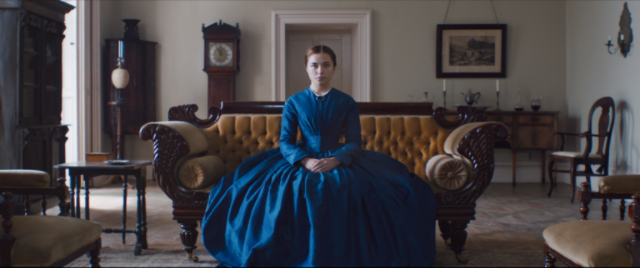
Exquisitely acted, framed and paced, William Oldroyd's Lady Macbeth is perhaps the most accomplished debut feature I've seen in years.
Based on Nicolai Lestov's Lady Macbeth of Mtsensk District, a 19th century Russian novel which was adapted and scripted by a well regarded feminist playwright Alice Birch, Oldroyd sets out to tell a Victorian era tale of adultery and murder with a twist. The result is a riveting movie watching experience. Lady Macbeth totally does justice to its title.
Katherine (radiant Florence Pugh), a young, bright-eyed, newlywed bride, quickly learns that a marriage in Victorian era England and at large is a life of submission, humiliation and being a captive.
The Father-in-law and husband team, Boris (Christopher Fairbank) and Alexander (Paul Hilton), represents a patriarchal world so rigid, hostile and loveless, it resembles a prison run by abusive guards - Katherine is not permitted to go outside the castle. She is told that she's not in need to ask the nature of her husband's businesses nor to know his whereabouts when he's supposedly away on business for days.
When Alexander returns, the bedroom business is anything but tender -- he orders her to strip and stand against the wall, looking away from him, while he jerks off. There is no touching, no tenderness, no passion. It's just a humiliating power game. But Katherine is no damsel in distress by any means. Far from it.
When the two brutes are out on business, Katherine is finally, temporarily, free to go outside and walk around the misty moors at the expense of horrified female servants.
One of the half-breed male servants, Sebastian (Cosmo Jarvis), working in the stable and horsing around with other stable hands, catches her eye and soon they become lovers. It starts out sensual and passionate. But soon the sexual power dynamic is reversed and Katherine dominates Sebastian both intellectually and physically.
Soon Boris discovers her secret, divulged by Anna (Naomi Ackie), a terrified black servant. Boris and Katherine's confrontation becomes violent, ending in death by a premeditated poisoning. With no witnesses around (except for Anna), Boris's death is ruled as a massive coronary. When her husband comes home while she is in bed with Sebastian, Katherine daringly manipulates the men to fight, plunging Sebastian deeper into the guilty party and deeper into her grasp.
Katherine's acts are so shocking to Anna, who witnesses her lady's immoral deeds, that she soon stops talking altogether.
Oldroyd orchestrates his theater trained, extremely measured, fitting visual style reminiscent of Haneke: static long takes, visual symmetry and only a few closeups. Ari Wegner's cinematography captures the beautiful, picturesque expanse of the moors and contrasts that with the cold, confounding interiors of the castle.
Even though Katherine is a murderess and not a likeable person, it's her youthful defiance that makes us root for her. She is radiating ball of energy that can't be contained by societal restrictions or codes or morality. She does whatever she can to survive, even using her perceived femininity and her status as a lady-of-the-house, to the fullest extent.
The real victims of Lady Macbeth are the servants. Oldroyd reminds you that in England, injustices are done and seen less as a racial issue and more of a class issue.
Pugh's central performance is nothing short of phenomenal. She wears her arrogant beauty and uses it so well in both being an offender and a victim. Her turn as a wide-eyed, untamable young woman becoming a calculating femme fatale is a sight to see. We are seeing an emergence of another important British actress and a heiress apparent to Kate Winslet.
With a crackling, loaded script by Birch, Lady Macbeth is an exhilarating, radical and timely examination of being a woman in a man's world.
Lady Macbeth opens in New York and Los Angeles on July 14.
No comments:
Post a Comment